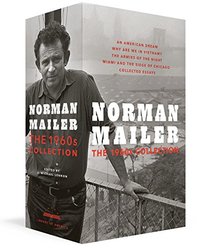Search -
Norman Mailer: The Sixties: An American Dream / Why Are We In Vietnam? / The Armies of the Night / Miami and the Siege of Chicago / Collected Essays (Library of America)
Norman Mailer The Sixties An American Dream / Why Are We In Vietnam / The Armies of the Night / Miami and the Siege of Chicago / Collected Essays - Library of America
Fifty years after the turmoil of 1968, modern America's most turbulent decade comes to life though the collected writings of its greatest literary provocateur — No writer plunged more wholeheartedly into the chaotic energies of the 1960s than Norman Mailer, as he fearlessly revolutionized literary norms and genres to capture the political, social... more »
Fifty years after the turmoil of 1968, modern America's most turbulent decade comes to life though the collected writings of its greatest literary provocateur — No writer plunged more wholeheartedly into the chaotic energies of the 1960s than Norman Mailer, as he fearlessly revolutionized literary norms and genres to capture the political, social... more »
ISBN-13: 9781598535570
ISBN-10: 1598535579
Publication Date: 2/27/2018
Pages: 1
Rating: ?
ISBN-10: 1598535579
Publication Date: 2/27/2018
Pages: 1
Rating: ?
0 stars, based on 0 rating
Genres:
- Literature & Fiction >> World Literature >> United States >> Anthologies
- Literature & Fiction >> Essays & Correspondence >> Essays
- Literature & Fiction >> History & Criticism >> Genres & Styles >> Historical Events
- Science & Math >> Essays & Commentary >> Commentary & Opinion




